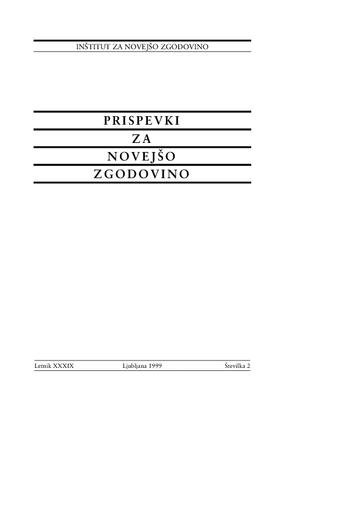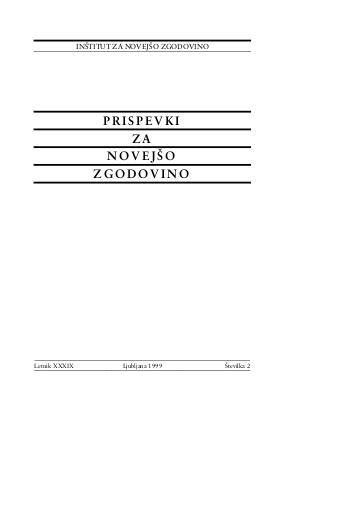
/
Periodicals
/
Prispevki za novejšo zgodovino
Influence of the Political and Nationalist Quarrels on the Economic Reforms
(The 1892 Austro-Hungarian Currency Reform and the role of the Slovenes)

Author(s):Andrej Pančur
Co-author(s):Jasna Fischer (odg. ur.)
Leto:1999
Publisher(s):Inštitut za novejšo zgodovino, Ljubljana
Language(s):slovenščina
Type(s) of material:text
Keywords:denar, gospodarska politika, politika, parlamentarni sistem, money, economic, politics, parliamentarism, Austro-Hungary, Slovenia
Rights:

This work by Andrej Pančur is licensed under Creative Commons Attribution-NonCommercial-NoDerivs 4.0 International
Files (1)

Name:Prispevki_za_novejso_zgodovino_1999_2.pdf
Size:2.41MB
Format:application/pdf
Permanent link:https://hdl.handle.net/11686/file221
Description
The nationalist and political quarrels in the Austrian part of the Habsburg Empire frequently rendered impossible a normal functioning of the State Parliament. Even during the time of Eduard Taaffe's government (1879-1893), when the State Parliament was able to function quite normally, the nationalist and political quarrels posed a threat to the government reforms. The author presents divisions during a parliamentary debate over a currency reform in 1892. In the process of rapprochement between the government and the United German Left, a political crisis broke out several times, in which the apple of discord were also the national differences between the Slovenes and the Germans. This threatened the adoption of the currency reform. Finally, the author presents the nationalist quarrels which were directly money related, that is, concerning the inscriptions on banknotes and coins.
Metadata (12)
- identifierhttps://hdl.handle.net/11686/1907
- title
- Vpliv političnih in nacionalnih bojev na gospodarske reforme
- (Primer avstroogrske valutne reforme leta 1892 in vloga Slovencev)
- Influence of the Political and Nationalist Quarrels on the Economic Reforms
- (The 1892 Austro-Hungarian Currency Reform and the role of the Slovenes)
- creator
- Andrej Pančur
- contributor
- Jasna Fischer (odg. ur.)
- subject
- denar
- gospodarska politika
- politika
- parlamentarni sistem
- money
- economic
- politics
- parliamentarism
- Austro-Hungary
- Slovenia
- description
- The nationalist and political quarrels in the Austrian part of the Habsburg Empire frequently rendered impossible a normal functioning of the State Parliament. Even during the time of Eduard Taaffe's government (1879-1893), when the State Parliament was able to function quite normally, the nationalist and political quarrels posed a threat to the government reforms. The author presents divisions during a parliamentary debate over a currency reform in 1892. In the process of rapprochement between the government and the United German Left, a political crisis broke out several times, in which the apple of discord were also the national differences between the Slovenes and the Germans. This threatened the adoption of the currency reform. Finally, the author presents the nationalist quarrels which were directly money related, that is, concerning the inscriptions on banknotes and coins.
- Nacionalni in politični boji so v avstrijskem delu Habsburške monarhije pogosto povsem onemogočili normalno delovanje državnega zbora. Tudi v obdobju vlade Eduarda Taaffeja (1879-1893), ko je državni zbor deloval povsem normalno, so nacionalne in politične razprtije lahko ogrozile vladne reforme. Avtor tako prikaže razprtije med parlamentarno obravnavo valutne reforme leta 1892. V procesu približevanja med vlado in Združeno nemško levico je večkrat prišlo do politične krize, v kateri so bila jabolko spora tudi slovensko nemška nacionalna nasprotja. S tem je bil ogrožen tudi sam sprejem valutne reforme.
- publisher
- Inštitut za novejšo zgodovino
- date
- 1999
- type
- besedilo
- language
- Slovenščina
- isPartOf
- rights
- license: ccByNcNd
Citirano v (1)
| Tipologija | Avtor(ji) | Naslov | Kraj | Založba | Leto |
|---|---|---|---|---|---|
| 1.01 Izvirni znanstveni članek | Pančur, Andrej | (Ne)primerljive razmere v čeških in slovenskih deželah v zadnjih letih Taaffejeve vlade | Ljubljana | Inštitut za novejšo zgodovino | 2005 |